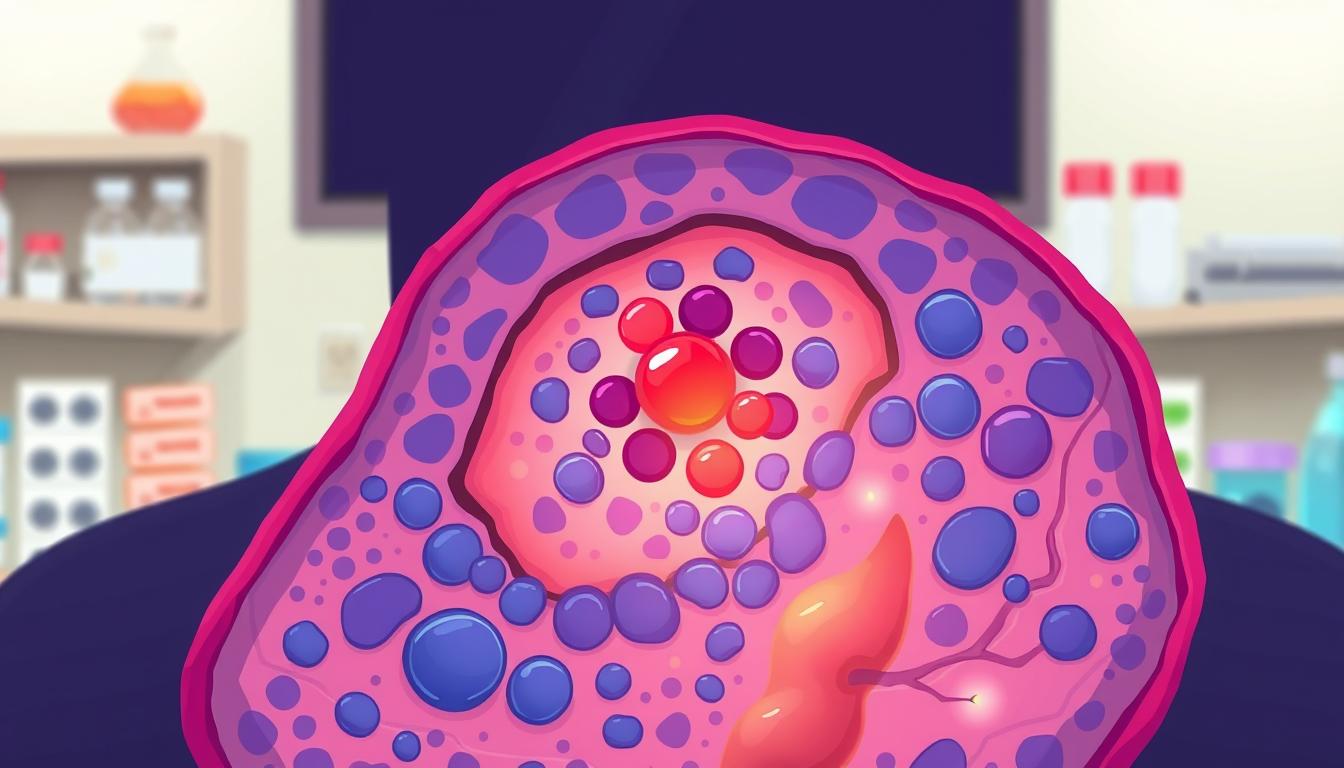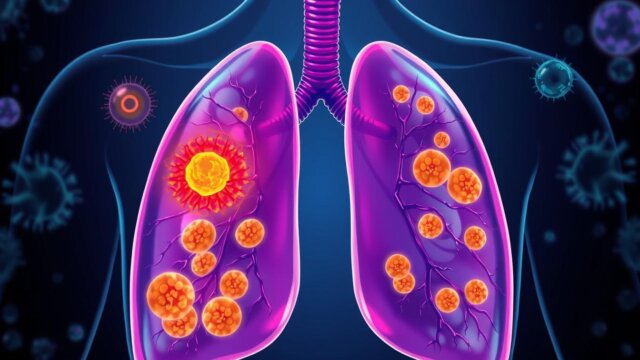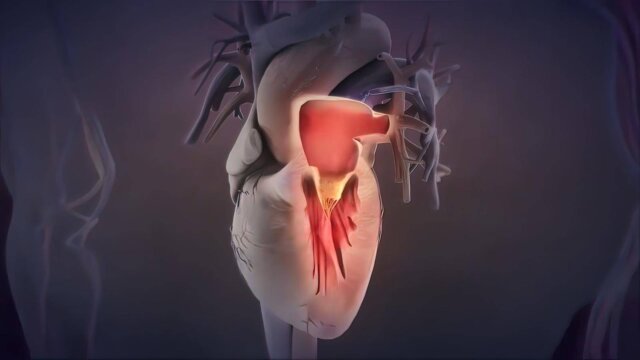FTC disclaimer: This post may contains affiliate links and we will be compensated if you click on a link and make a purchase.
Did you know 30% of Americans over 50 have adenomas? These are noncancerous tumors that can grow in organs like the colon. While they’re usually not harmful, some can turn into cancer if not treated. This article will cover adenoma’s causes, symptoms, diagnosis, and treatments. We’ll also talk about how to prevent and manage it.
Adenomas grow from glandular tissue in the body. They can show up in the colon, pituitary gland, thyroid, breasts, kidneys, and adrenal glands. Most are harmless, but big ones or those with a certain pattern might have cancer cells. People with certain types of adenomas, like serrated polyps, are at higher risk for colon or rectal cancer.
Key Takeaways
- Adenomas are noncancerous growths that can develop in various organs, including the colon.
- Larger adenomas and those with a villous growth pattern are more likely to contain cancer cells.
- Serrated polyps, a type of adenoma, are associated with an increased risk of colorectal cancer.
- Adenomas are usually removed during a colonoscopy procedure.
- Maintaining a healthy lifestyle and regular screening can help prevent the development of adenomas and reduce the risk of cancer.
It’s important to understand adenomas to keep yourself healthy. By working with your doctor, you can manage this condition. This helps prevent more serious problems.
What is an Adenoma?
An adenoma is a non-cancerous tumor in glandular tissue of organs. It can appear in the colon, pituitary gland, thyroid gland, and more. Though not cancerous, some adenomas might turn cancerous if not treated.
Definition and Types of Adenomas
Adenomas can be found in many places, like the colon and thyroid gland. They are also found in the liver and lungs, but less often. The colon is most affected, with a high risk of turning into colon cancer.
Pituitary gland adenomas, like prolactinomas, are common in women. They often respond well to treatment. Adrenal gland adenomas can cause hormone imbalances.
Fibroadenomas in the breasts are common in young women. They might need to be removed surgically. Kidney adenomas can affect the kidney tubules and might become cancerous.
Large adenomas in hormone-producing organs can cause serious problems. Ashkenazi Jews are at a higher risk of adenomas and colon cancer. About 1 in 10,000 adrenal adenomas are cancerous.
One in 10 people have thyroid nodules. Around 10% of neurological patients have pituitary adenomas.
Salivary gland tumors are mostly benign. Grade 1 cancers have a good prognosis, but Grade 3 grow and spread quickly. Treatment for prostate adenoma includes surgery and monitoring. After removing colon adenomatous polyps, follow-up colonoscopy is recommended after 5-10 years.

Causes of Adenomas
Adenomas, also known as adenomatous polyps, are common in the large intestine. They start from glandular tissue cells in the colon. If not treated, they can turn into cancerous tumors.
The exact cause of adenomas is still a mystery. But, it’s thought that cells in the glandular tissue don’t follow their normal life cycle. Instead, they keep dividing abnormally.
Uncontrolled cell division leads to both adenomas and cancerous tumors. Adenomas grow slower and are less aggressive than cancer. While we don’t know what triggers this division, some risk factors can increase the chance of getting an adenoma.
- Age is a big factor, as more people get colon polyps as they get older. By age 50, 25% to 30% have them, and by 70, it’s 50% in countries like the United States.
- Having a family history of colon cancer or polyps also raises the risk. Disorders like familial adenomatous polyposis (FAP) and Lynch syndrome are linked to polyps.
- Lifestyle choices like smoking, drinking too much alcohol, being overweight, not exercising, and eating too much fat can also lead to adenomas.
- Having inflammatory bowel diseases like ulcerative colitis or Crohn’s disease also increases the risk of colon polyps and cancer.
- Some types of polyps, like villous adenomas, are flat and spread more. They are more likely to become cancerous.
Knowing the risk factors and causes of adenomas is key to preventing and treating them. Regular screenings and early detection can greatly lower the risk of colon cancer. This is by finding and removing adenomas before they turn cancerous.

Adenoma Symptoms
Adenomas are noncancerous growths that can appear in the thyroid, adrenal glands, and colon. Many adenoma symptoms are not noticeable early on. But, the location of the adenoma can affect the symptoms.
Thyroid adenomas can cause weight loss, tremors, and irregular heartbeat. This is because they can produce too many hormones. Adrenal adenomas might lead to easy bruising, weakness, weight gain, and high blood pressure. Also, colorectal adenomas might not show symptoms. But, they can cause abdominal pain, rectal bleeding, or changes in bowel habits.
Not all adenomas cause symptoms. Most pituitary tumors are not cancerous. They grow slowly and don’t spread. The size of the adenoma also matters. Larger adenomas can cause more problems than smaller ones.
Adenoma Type | Potential Symptoms |
|---|---|
Thyroid Adenoma | Weight loss, tremors, irregular heartbeat |
Adrenal Adenoma | Easy bruising, weakness, weight gain, high blood pressure |
Colorectal Adenoma | Abdominal pain, rectal bleeding, changes in bowel habits |
Knowing the adenoma symptoms is key. If you notice any unusual signs, see a doctor. Early detection and treatment can prevent serious issues.
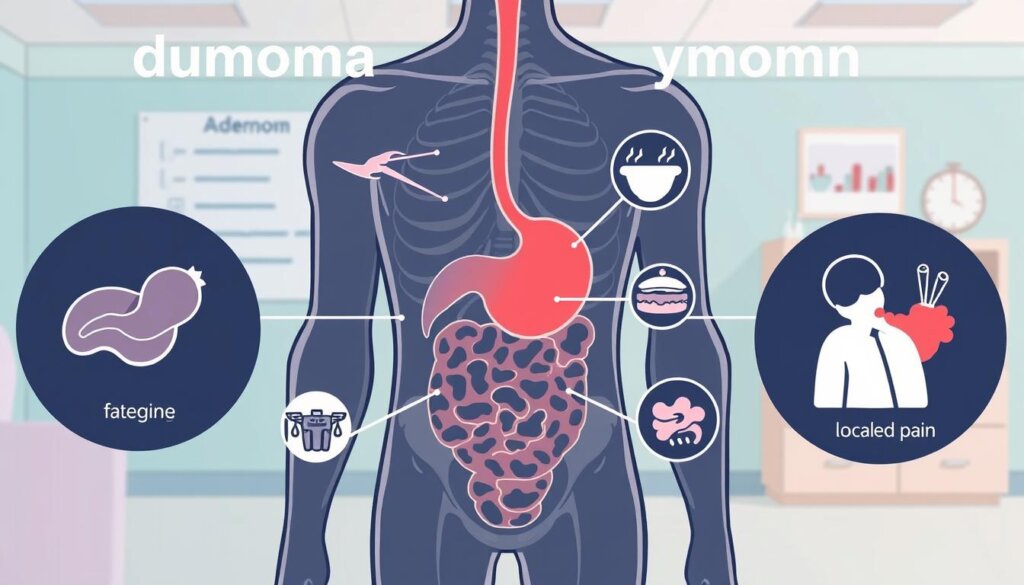
“Approximately 50% of adenomas produce excessive amounts of one or more particular hormones.”
Adenomas are usually not life-threatening. But, knowing the symptoms and getting medical help when needed is crucial. This way, you can get the right treatment and keep your health in check.
Diagnosis of Adenomas
Adenomas are found in many parts of the body. They are diagnosed through imaging and tests. Colon polyps, a type of adenoma, are found during colonoscopy or sigmoidoscopy. Thyroid and breast adenomas are seen in an ultrasound exam.
Diagnostic Tests for Adenomas
A biopsy might be needed to check for cancer cells. These tests help doctors know if it’s an adenoma or cancer. They also decide how to treat it.
Pituitary adenomas are checked by testing hormones like prolactin and GH. A study found most were non-functioning adenomas, followed by prolactin-secreting and GH-secreting adenomas.
Adenoma Type | Prevalence |
|---|---|
Non-functioning Adenomas | 43% |
Prolactin-secreting Adenomas | 40% |
Growth Hormone (GH) Secreting Adenomas | 11% |
Adrenocorticotropic Hormone (ACTH) Secreting Adenomas | 6% |
Benign tumors of the ampulla of Vater are rare. Adenomas are common but can turn into cancer.
These tests help doctors understand adenomas. They can then plan the best treatment for the patient. 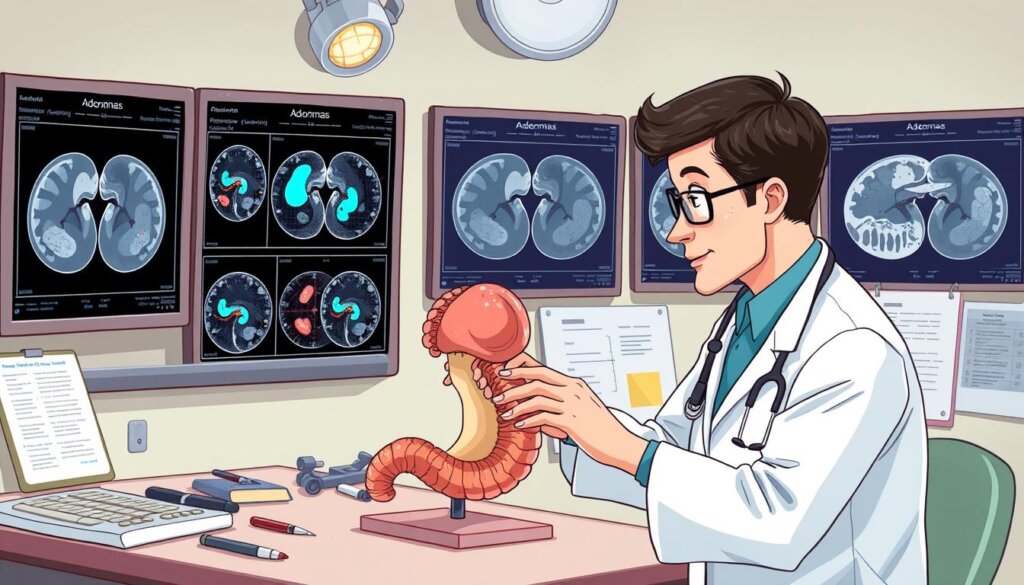
Adenoma Treatment Options
Adenoma treatment depends on the tumor’s location, size, and any hormonal imbalances. For colon polyps, a common treatment is polypectomy, a surgery to remove the polyp.
For adenomas in other organs, like the thyroid or adrenal glands, a “watchful waiting” approach might be used. This is for small, asymptomatic adenomas. But, if the adenoma is large or causing problems, surgery might be needed.
Pituitary adenomas grow slowly and often go unnoticed. Doctors use blood tests, MRI scans, CT scans, and vision tests to diagnose them. If they’re not causing symptoms, they might not need treatment. But, if they are, treatment options include surgery, medication, or radiation therapy.
Surgery to remove a pituitary tumor can be done through the nose or with a craniotomy. Risks include bleeding, infection, and damage to the gland, which can cause diabetes insipidus. Sometimes, radiation therapy is used after surgery to treat any remaining tumor or symptoms.
Treatment for adenomas is customized for each patient and tumor. It’s important to carefully evaluate and monitor each case to get the best results.
Preventing Adenomas
Adenomas, which can lead to colorectal cancer, can be stopped by regular checks and a healthy lifestyle. Studies show that eating less fat and more fiber, taking fiber supplements, and using antioxidants can help.
Regular checks like colonoscopies are key in finding and removing polyps early. Eating foods high in fiber and fruits, and less red meat, also helps.
Staying active and not smoking can also help prevent adenomas. For those with a family history of cancer, genetic tests and advice can be helpful.
Preventive Measure | Potential Impact |
|---|---|
Regular Colorectal Cancer Screening | Early detection and removal of precancerous polyps |
Balanced, High-Fiber Diet | Reduced risk of adenoma development |
Regular Physical Activity | Improved overall health and reduced cancer risk |
Avoiding Tobacco Use | Lower risk of adenomas and colorectal cancer |
Genetic Testing and Counseling | Personalized risk assessment and prevention strategies |
By living healthy and getting regular checks, you can lower your risk of adenomas and colorectal cancer.
“Colorectal cancer is a major cause of morbidity and mortality in industrialized countries, and experimental evidence supports the hypothesis that dietary fiber may protect against its development.”
Even though more research is needed on fiber, a healthy lifestyle is key to avoiding adenomas.
Adenoma Outlook and Prognosis
The outlook for people with adenomas is usually good. Adenomas are not cancerous, but some can turn into cancer if not treated. Pituitary adenomas, found in the brain, are mostly non-cancerous. They can be treated with surgery, radiation, or medicine. The 5-year survival rate for these tumors is 97%.
Only about 10 percent of adenomas will become cancerous. Yet, most colon cancers start from adenomas. Early detection and treatment, like removing colon polyps, can lower cancer risk.
Most people with adenomas can live well and avoid big problems with the right care. But, bigger tumors in the pituitary gland can be harder to remove. Still, most pituitary tumors are treated successfully.
“The prognosis for individuals with adenomas is generally good, as the majority of these benign tumors do not progress to cancer.”
Adenomas can be worrisome, but with regular checks and early treatment, most people do well. Knowing the risks and acting early can help keep you healthy. This way, you can lower the chance of adenomas turning into serious problems.
Living with Adenomas
Getting a diagnosis of adenoma can be scary. But, with the right care, you can stay healthy and avoid big problems. Colorectal cancer (CRC) is the third most common cancer in the USA and UK. It mostly hits people over 50.
About 43% of CRC can be stopped by changing risk factors like being active, not being too heavy, and eating right.
Managing Adenomas and Follow-Up Care
If you have adenoma, you need to work with your doctor to make a plan. This might include regular check-ups, tests, and sometimes surgery to remove the adenoma. The UK has started CRC screening with faecal occult blood testing (FOBT).
Your doctor might suggest eating better and exercising more. These steps can lower your chance of adenoma coming back and CRC happening.
- Eat a diet full of fruits, veggies, and whole grains.
- Do at least 30 minutes of exercise like walking, swimming, or cycling every day.
- Keep a healthy weight to avoid obesity, which is a risk factor for adenomas and CRC.
It’s important to keep up with follow-up care if you have adenomas. Doctors say to have another colonoscopy in 7-10 years if small adenomas are removed. If you have more adenomas, you might need to go back sooner.
By following your doctor’s advice and making healthy choices, you can manage your adenomas. This helps lower your risk of CRC. Early detection and care are key to staying healthy.
“Staying vigilant and adhering to your follow-up care plan is essential for managing adenomas and safeguarding your long-term health.”
Conclusion
Adenomas are common, non-cancerous tumors found in glandular tissues. Their exact causes are still a mystery. Adenomas can be harmless or lead to health problems, depending on their size and location.
It’s crucial to catch adenomas early and treat them properly. This might mean surgery or watching them closely. This approach helps avoid serious issues, like cancer.
For instance, thyroid adenomas are found in 3% to 4.3% of people in autopsy studies. They are more common in women. Also, the chance of cancer in toxic adenomas is less than 1%. But, the risk is 20% for nodules that don’t work well.
Knowing about adenomas helps people stay healthy. They can work with doctors to keep their health in check. This includes regular check-ups and tests. The main thing is to find adenomas early and treat them right to get the best results.
FAQ
What is an adenoma?
An adenoma is a small, usually harmless tumor. It grows in glandular tissue of organs like the colon and thyroid gland.
What are the different types of adenomas?
Common adenomas include those in the colon, thyroid, and adrenal glands.
What causes adenomas to develop?
Adenomas happen when gland cells don’t die as they should. They keep growing in an abnormal way.
What are the symptoms of adenomas?
Many adenomas don’t show symptoms early on. But, symptoms can appear based on where the adenoma is. These might include weight loss or changes in bowel habits.
How are adenomas diagnosed?
Doctors use tests like colonoscopy and ultrasound to find adenomas. These help tell them apart from cancer.
How are adenomas treated?
Treatment depends on the adenoma’s size and location. It might be removed surgically or watched closely if small and not causing problems.
How can adenomas be prevented?
Preventing adenomas involves regular screening and a healthy lifestyle. This includes a balanced diet and avoiding tobacco.
What is the prognosis for individuals with adenomas?
Most adenomas are not cancerous. But, some can turn into cancer if not treated. The outlook is usually good, though.
How can individuals with adenomas manage their condition?
Managing adenomas means regular check-ups and possibly surgery. Working with your doctor is key to a good plan.
